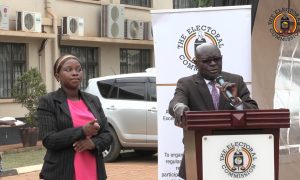A landmark constitutional challenge has been filed against the recently enacted Uganda People’s Defence Forces (Amendment) Act, 2025, with prominent rights advocate and constitutional law scholar Dr. Dennis Daniel Ssemugenyi seeking to have the law nullified in its entirety.
Filed on June 20 before the Constitutional Court, the petition raises two critical concerns: the expanded jurisdiction of military courts over civilians, and structural malapportionment in Uganda’s electoral framework, which the petitioner argues undermines the legitimacy of the Parliament that passed the law.
At the core of the suit is Section 3 of the new amendment, which grants military courts the power to try civilians in certain circumstances.
Dr. Ssemugenyi contends that this provision offends the Constitution, specifically Article 28(1), which guarantees every citizen the right to a fair hearing before an independent and impartial civilian court.
He further invokes Article 44(c), which prohibits derogation from the right to a fair hearing even during times of emergency, as well as Articles 119, 120, and 126, which enshrine prosecutorial independence and judicial impartiality.
“This petition is not political, it is constitutional. It is a quiet but resolute appeal to protect the rule of law, justice, and civilian oversight in Uganda,” Dr. Ssemugenyi stated in a statement shared with UG EXCLUSIVE.
He argues that the UPDF (Amendment) Act is not only unconstitutional but also amounts to a legislative reversal of previous Supreme Court rulings, thereby breaching the principle of separation of powers.
Electoral Imbalance Questioned
Beyond the content of the law, the petition raises broader questions about the constitutional validity of the Parliament itself. Dr. Ssemugenyi challenges Uganda’s current constituency structure, citing Article 63(3) of the Constitution, which requires near-equal population distribution across constituencies.
Based on Uganda’s projected population of 51.4 million and 353 constituencies, the average population per Member of Parliament should be around 70,000.
However, the petition highlights stark population discrepancies, with some constituencies, primarily opposition strongholds, hosting more than double the average, while others, mostly aligned with the ruling NRM party, fall significantly below the threshold.
According to Dr. Ssemugenyi, this malapportionment allows for an artificial parliamentary majority that does not reflect the principle of equal suffrage, thereby enabling contentious laws to be passed without genuine national consensus.
“The skewed constituency sizes breach constitutional requirements and subvert democratic representation,” he argues.
He is seeking declarations from the Court that:
- The UPDF (Amendment) Act, 2025, is unconstitutional and void.
- Military trials for civilians are inconsistent with constitutional guarantees.
- Uganda’s current constituency demarcation violates the Constitution and enables unfair legislative outcomes.
Legal scholars say the petition raises foundational constitutional questions that could reshape both Uganda’s civil-military dynamics and the legitimacy of its legislative processes.
A constitutional law lecturer at Makerere University, speaking anonymously, said, “If the Court rules in favour of the petitioner, it could lead to a major recalibration of how Uganda balances security interests with constitutional safeguards.”
By press time, neither the Ministry of Defence nor the Attorney General’s Chambers had commented on the matter. However, civil society organisations have welcomed the petition as a vital step toward reclaiming constitutional order and democratic accountability.




















